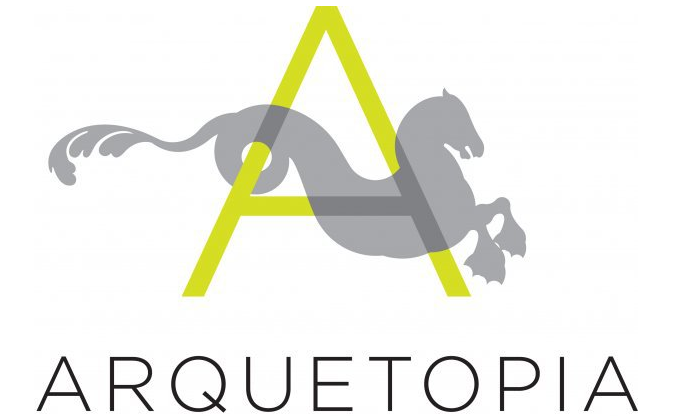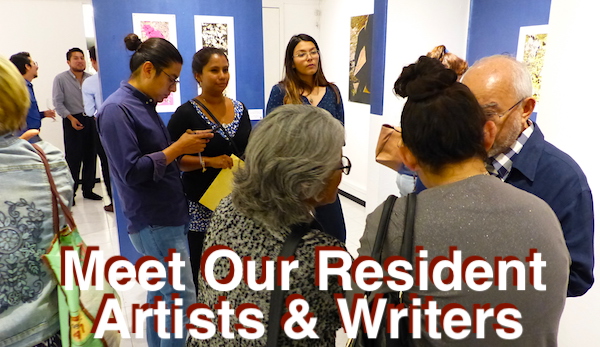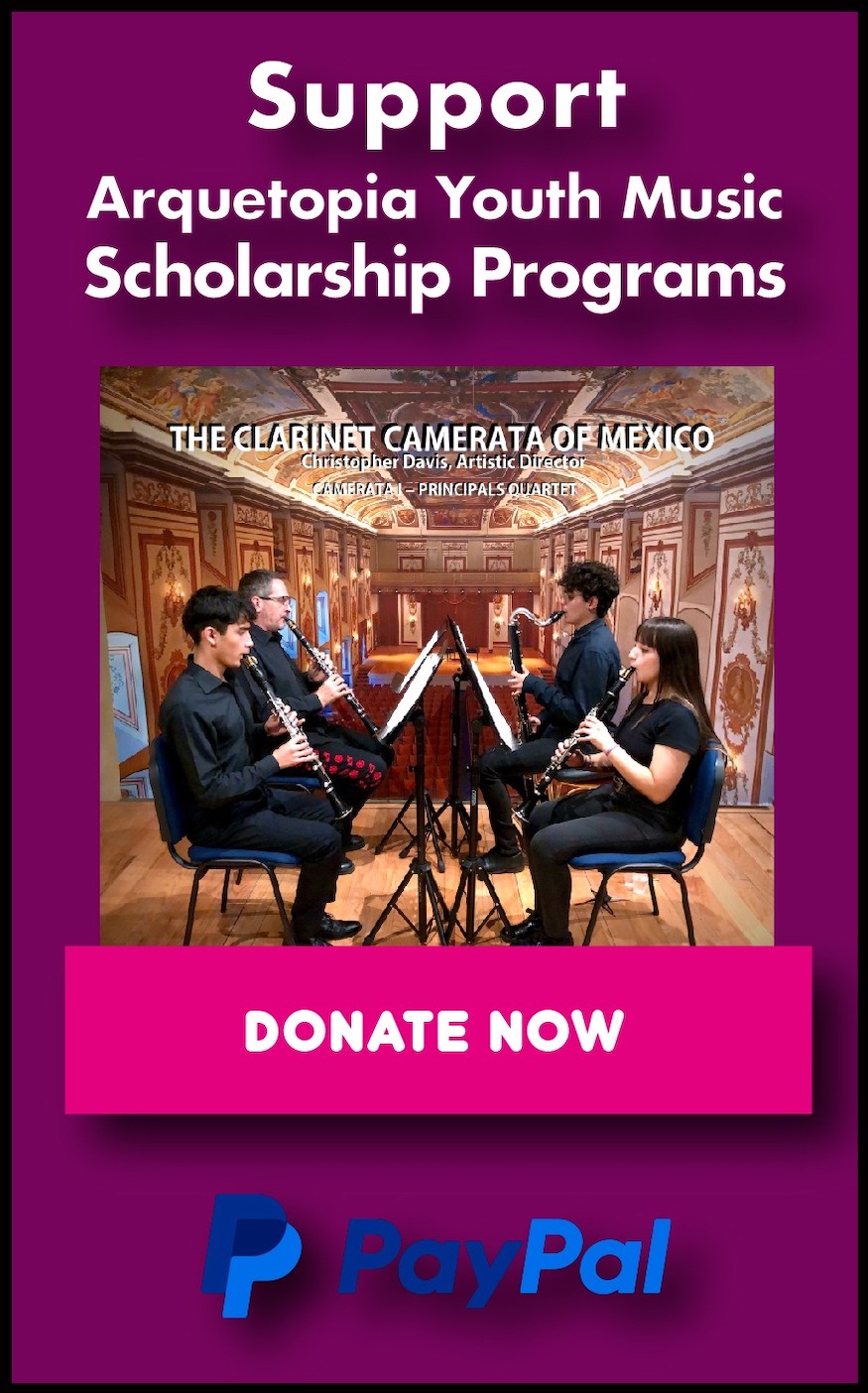The End of the Grand Tour?
Virtual Symposium on Artist Residencies: Future, Place and State
please scroll down to the program section below.
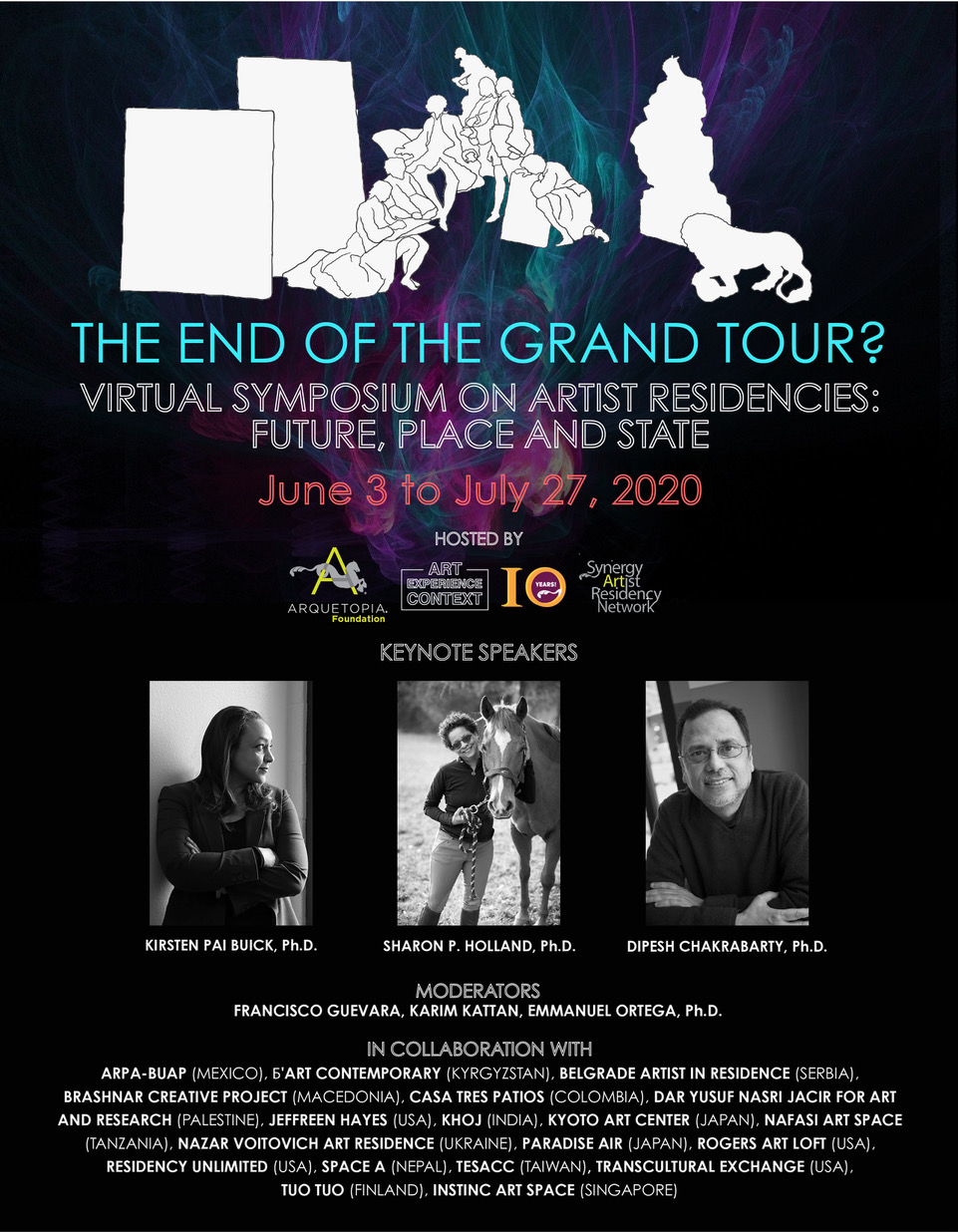
Virtual Symposium on Artist Residencies: Future, Place and State
June 3 to July 27, 2020
It is indisputable that artist residencies have become crucial nodes for the art world, as they have expanded worldwide and exponentially in numbers in the last decades. Artist residencies provide much needed infrastructure and networks for the cultural sector; therefore, they have become sites of production and experimentation, spaces for research and sharing, and places where multiple artists and diverse ideas circulate. However, residencies are also burdened with the weight of history; they are subject to economic, geopolitical, and ideological pressures while constantly being reminded of the challenges of self-sustainability.
Theodoor Galle (after Johannes Stradanus) “The Discovery of America,” from Nova Reperta, c. 1600, engraving, published by Philips Galle, 27 x 20 cm (The Metropolitan Museum of Art)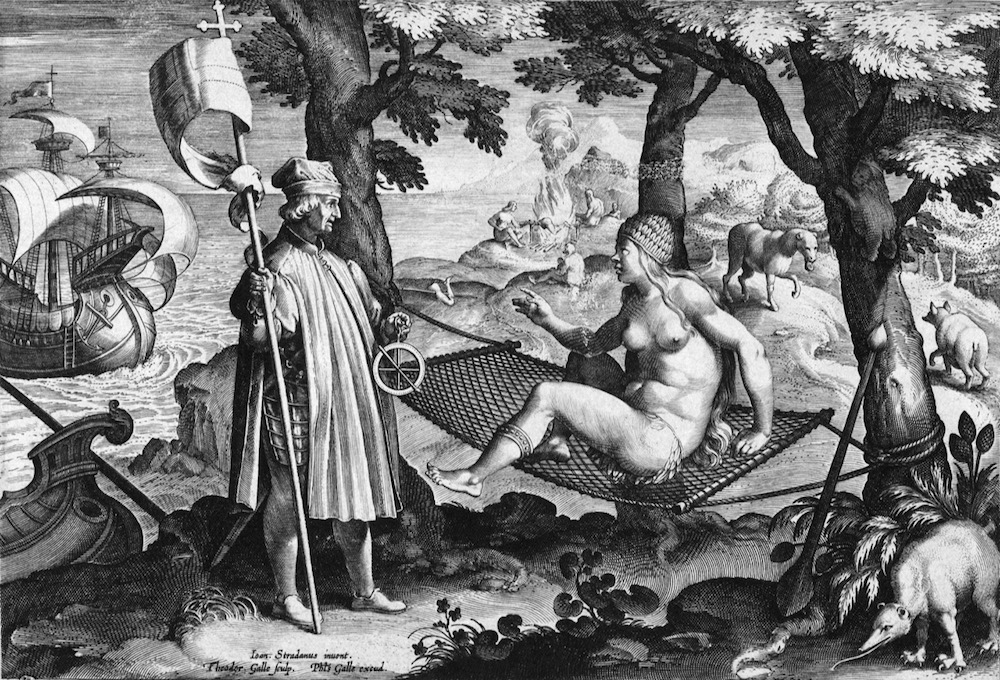
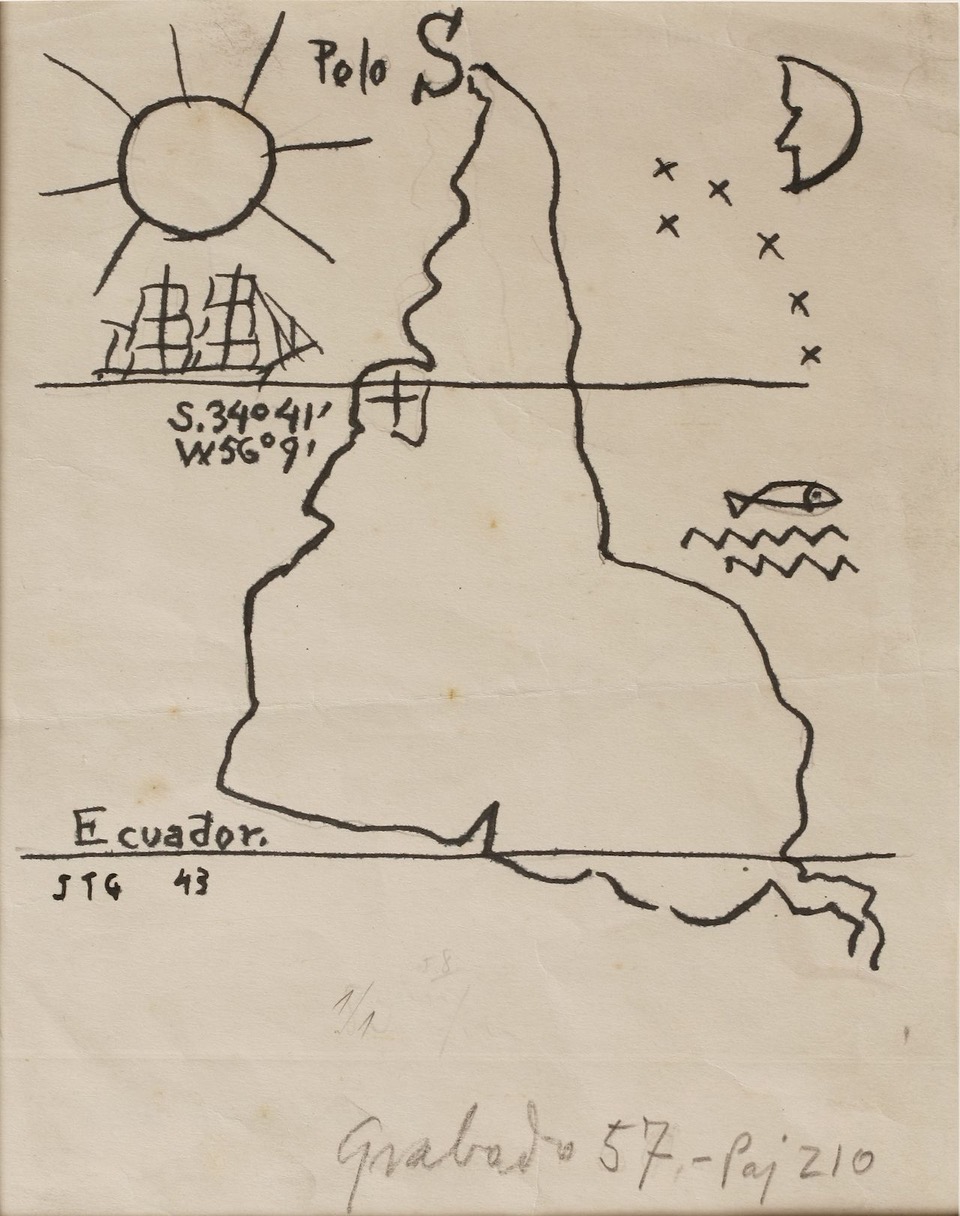 Joaquin Torres García, América Invertida (Inverted America), 1943, ink on paper, 22 x 16 cm (Fundación Torres García, Montevideo)
Joaquin Torres García, América Invertida (Inverted America), 1943, ink on paper, 22 x 16 cm (Fundación Torres García, Montevideo)
In the book, Contemporary Artist Residencies: Reclaiming Time and Space, editors Taru Elfving and Irmeli Kokko urgently convey us to continue critical discussions and radical experimentation in the face of uncertainty, which couldn’t be more relevant than today. The End of the Grand Tour? Virtual Symposium on Artist Residencies: Future, Place and State, organized by Arquetopia Foundation and Synergy Artist Residency Network, in collaboration with multiple institutions around the globe, is the conversation that follows such a departing point, in an effort to continue the critical dialogue on the subject of artist residencies. Although the Grand Tour is a fairly vague construction that changed through the centuries, it has shaped ideas about destinations and gave origin to a long-lasting practice of traveling for education, personal development and culture, a tradition that continues to resonate and that artist residencies have reclaimed. Nevertheless, and especially in these tumultuous times, it is necessary to re‑examine with a magnifying glass the limitations of sustainability alongside the legacy of history, including the dark implications of art in the invention of place, as a fantasy product of the mutual investment of power and images. “Picture Gallery with Views of Modern Rome”, Giovanni Paolo Pannini, Oil on canvas, 170.2 x 244.5 cm. 1757
“Picture Gallery with Views of Modern Rome”, Giovanni Paolo Pannini, Oil on canvas, 170.2 x 244.5 cm. 1757
“An uncertain future” is what would closely describe the reality that artist residencies are facing after the events of the year 2020. We have all been forced to rethink our relationship to place and history, and to re-examine our sense of community. More than ever, borders have proven to be a fragile invention; however, the restrictions on mobility have been experienced by everyone. This is an opportunity to explore new collaborations across borders, reimagine our communities and expand the possibilities of our interconnectivity. In the words of Audre Lorde, “Without community there is no liberation.”
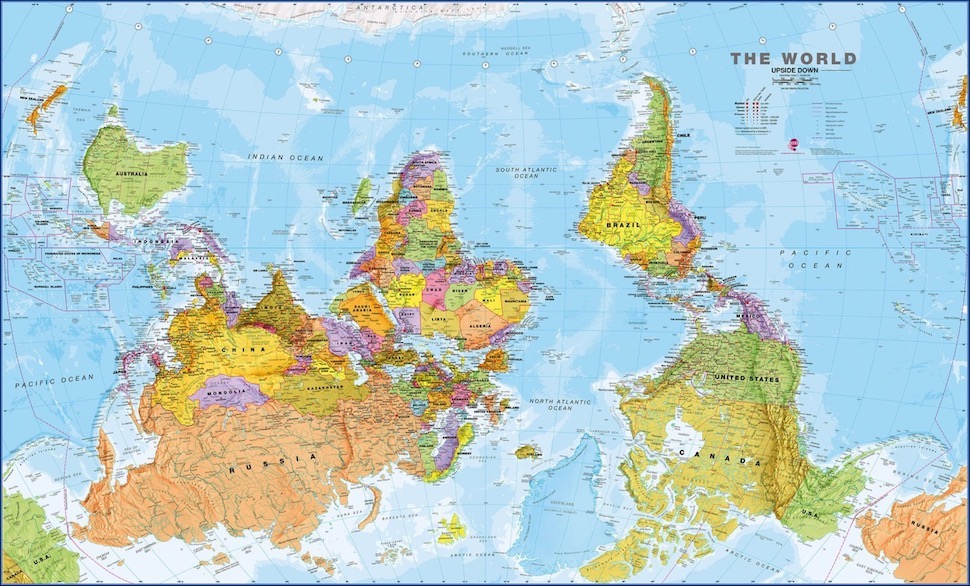
This virtual symposium is organized in sessions that will include virtual keynotes and round tables through a series of panels that will include the perspectives and experiences from artist residencies and cultural institutions, as well as the expertise of scholars from diverse backgrounds and different locations around the globe. Each participant has been carefully selected considering mission, scope of programs, relevance in the field, community engagement and geographical location to ensure a multiplicity of perspectives and experiences. Arquetopia is organizing this event for free, providing the technology and logistical support, hosting each session as a video call with a keynote speaker or a scholar as guest moderator that will facilitate the discussion of the specific topic to engage the participant organizations. All sessions will be privately recorded to control the audio and video quality and broadcasted in social media to ensure accessibility for different audiences in multiple countries.
Monday, June 8, 2020 – CLICK HERE TO VIEW THIS SESSION
WELCOME – Francisco GUEVARA , Co-Executive Director, Arquetopia Foundation (Mexico, Peru, Italy)
Place and History: An Imaginative Distortion of the Encounter
9:00 AM Mexico City CDT (10:00 AM EDT, 7:00 AM PDT, 4:00 PM Paris, 5:00 PM Dar es Salaam, 7:45 PM Kathmandu, 10:00 PM Taipei, 11:00 PM Tokyo)
Friday, June 12, 2020 – CLICK HERE TO VIEW THIS SESSION
OPENING KEYNOTE ADDRESS – Dr. Kirsten Pai BUICK, The University of New Mexico
The Thrill of It All: Cultures of Consent and Fantasies of Conquest in the Artist Residency Experience
9:00 AM Mexico City CDT (10:00 AM EDT, 7:00 AM PDT, 4:00 PM Paris, 5:00 PM Dar es Salaam, 7:45 PM Kathmandu, 10:00 PM Taipei, 11:00 PM Tokyo)
Wednesday, June 17, 2020 – CLICK HERE TO VIEW THIS SESSION
PANEL DISCUSSION #1 – Karim KATTAN (Palestine), Moderator
Mobility and the Legacy of the Grand Tour: Tourism, Residencies, and Other Fantasies
9:00 AM Mexico City CDT (10:00 AM EDT, 7:00 AM PDT, 4:00 PM Paris, 5:00 PM Dar es Salaam, 7:45 PM Kathmandu, 10:00 PM Taipei, 11:00 PM Tokyo)
Panelists: Jesse GERARD MPANGO, Nafasi Art Space (Tanzania) – Francisco GUEVARA, Arquetopia Foundation (Mexico, Peru, Italy) – Emily JACIR, Dar Yusuf Nasri Jacir for Art and Research (Palestine) – Ankica MITROVSKA, Brashnar Creative Project (Macedonia)
Although the Grand Tour is a fairly vague construction that changed through the centuries, it has shaped ideas about destinations and gave origin to a long-lasting practice of traveling for education, personal development and culture, a tradition that continues to resonate and that artist residencies have reclaimed. The idea of the world becoming more mobile is a masquerade for the differences in which we experience mobility; therefore cultural mobility has deep historical implications with long-lasting and damaging consequences in many regions around the world, most often concealing a skewed perspective on these regions while romanticizing the transformative potential of art in regard to the processes of art making and international encounters. Because art and power are mutually implicated, in cultural mobility, they very often enact a fantasy that creates distortions, inequalities, ideological biases, and blind spots, especially when engaging local communities and international artists (Bolton, 2010; Cash, Buick and Rojas, 2016; Holland, 2012; Nochlin, 1989; Jones and Stephenson, 1999; Rancière, 2009). How can we establish distance between the fantasies of the Grand Tour and the fetishes of mobility, to rethink cultural cooperation while interrupting the tradition of movement at the expense of exploitation?
Wednesday, June 24, 2020 – CLICK HERE TO VIEW THIS SESSION
PANEL DISCUSSION #2 – Dr. Emmanuel ORTEGA (USA), Moderator
Facing Differences: Residencies Beyond the Art World
9:00 AM Mexico City CDT (10:00 AM EDT, 7:00 AM PDT, 4:00 PM Paris, 5:00 PM Dar es Salaam, 7:45 PM Kathmandu, 10:00 PM Taipei, 11:00 PM Tokyo)
Panelists: Shaarbek AMANKUL, Б’Art Contemporary (Kyrgyzstan) – Kaitlyn D. HAMILTON & Joni JUDÉN, Tuo Tuo (Finland) – Jupiter PRADHAN, Space A (Nepal) – Pooja SOOD, Khoj (India)
It is indisputable that artist residencies have become crucial nodes for the art world, as they have expanded worldwide and exponentially in numbers in the last decades. Artist residencies provide much needed infrastructure and networks for the cultural sector (Smith, 2012); therefore, they have become sites of production and experimentation, spaces for research and sharing, and places where multiple artists and diverse ideas circulate. Nevertheless, residencies are also burdened with the weight of history; they are subject to economic, geopolitical, and ideological pressures while constantly being reminded of the challenges of self-sustainability (Guevara, 2019). Although residency models and their roles are numerous and diverse, especially considering their contexts and missions, anyone around the world who engages with them is confronted with the question of difference. In the work of Audre Lorde, we find that differences should not be understood as tolerance, but as necessary to generate power and actively “be” in the world; in her own words, “Divide and conquer, in our world, must become define and empower.” What is the function of residencies as spaces where communities intersect and negotiate difference? How can we achieve sustainability without sacrificing our ethical commitment to our communities?
Monday, June 29, 2020 – CLICK HERE TO VIEW THIS SESSION
KEYNOTE ADDRESS – Dr. Sharon P. HOLLAND, The University of North Carolina at Chapel Hill
"Hum.animal.blackness: a New Approach to Animal Studies"
9:00 AM Mexico City CDT (10:00 AM EDT, 7:00 AM PDT, 4:00 PM Paris, 5:00 PM Dar es Salaam, 7:45 PM Kathmandu, 10:00 PM Taipei, 11:00 PM Tokyo)
This talk presents Dr. Holland’s most recent work, which explores vulnerability, accident, and love, at the intersection of the Racial Contract, a particular pattern of localized and global cognitive dysfunctions, as defined by Charles Mills. By examining Heidegger’s notion that humans “die” while animals “perish,” she reads across a theoretical spectrum of works on the human/animal distinction. “The animal is a necessary reminder of the limits of the human; its historical and ontological contingency; of the precariousness of the human as a state of being, a condition of sovereignty, or an ideal of self-regulation.” –Elizabeth Grosz, Becoming Undone: Darwinian Reflections on Life, Politics and Art. Dr. Holland’s research touches on the early incarnation of MOVE, organization internationally known through its activism in the 1970s and 80s, and in particular, their animal liberation stance, one that has gone largely unrecognized. Through her presentation, Dr. Holland asks questions about what activism means to the struggle for animal life and human dignity at large in the context of work in Animal Studies.
Wednesday, July 1, 2020 – CLICK HERE TO VIEW THIS SESSION
PANEL DISCUSSION #3 – Francisco GUEVARA , Moderator
Local Knowledge: Dignity, Solidarity, Sustainability, Social Justice
9:00 AM Mexico City CDT (10:00 AM EDT, 7:00 AM PDT, 4:00 PM Paris, 5:00 PM Dar es Salaam, 7:45 PM Kathmandu, 10:00 PM Taipei, 11:00 PM Tokyo)
Panelists: Tony EVANKO, Casa Tres Patios (Colombia) – Dr. Jeffreen HAYES (USA) – Mami KATSUYA, Kyoto Art Center (Japan) – Liudmyla NYCHAI, Nazar Voitovich Art Residence (Ukraine) – Shih Yun YEO, Instinc Art Space (Singapore)
Violence, oppression, and even colonization can’t be interpreted as pure and simple domination, especially considering that contestation and resistance has always been a counter reaction that has continuously allowed communities to transform themselves. Boaventura de Sousa Santos explains that the power of communities reside in “the construction and validation of knowledge born in struggle, of ways of knowing, developed by social groups as part of their resistance against systematic injustices and oppressions caused by capitalism, colonialism, and patriarchy.” In that sense, artist residencies around the globe and the multiplicity of their models, have allowed them to effectively adapt to the local artistic and cultural needs, while gaining traction to impact the development of artistic discourses at a global scale (Smith 2012, Guevara 2019). In the book Contemporary Artist Residencies: Reclaiming Time and Space, editors Taru Elfving and Irmeli Kokko urgently convey us to continue critical discussions and radical experimentation in the face of uncertainty; more than ever, concepts such as dignity, solidarity, sustainability and social justice are relevant to the practice of artist residencies. What have we learned locally that could be implement interculturally and transnationally?
Wednesday, July 8, 2020 – CLICK HERE TO VIEW THIS SESSION
PANEL DISCUSSION #4 – Dr. Emmanuel ORTEGA , Moderator
Gaze and Place: The Act of Travel and the Invention of Destinations
9:00 AM Mexico City CDT (10:00 AM EDT, 7:00 AM PDT, 4:00 PM Paris, 5:00 PM Dar es Salaam, 7:45 PM Kathmandu, 10:00 PM Taipei, 11:00 PM Tokyo)
Panelists: Rebecca COREY, Nafasi Art Space (Tanzania) – Karim KATTAN (Palestine) – Mary SHERMAN, TransCultural Exchange (USA) – Ryan Elisabeth REID & Lance L. SMITH, Rogers Art Loft (USA)
Place is a verb rather than a noun; it is a resource and a symbol, an instrument of power that naturalizes a cultural and social construction (Buick, 2019) and it is always contingent to gaze. Several examples associated with place have been ideologically invented through history including “nature,” “landscape,” and “geography.” In her famous essay “The Imaginary Orient,” Linda Nochlin explains that all colonial and touristic presences are dependent on their apparent absences while also bringing into existence the notion of place through their controlling gazes. This how places are invented, “a world of timeless, atemporal customs and rituals, untouched by the historical processes” (Nochlin, 1989). In that sense, artists residencies become mediators of history and place, and are constantly being forced to negotiate with the art world while being challenged by their own local context. What happens when an artist engages with artistic processes while immersed in a community where its culture, people, and even the place itself have been imagined and reimagined by art history and, in general, the dominant visual culture?
Wednesday, July 15, 2020 – CLICK HERE TO VIEW THIS SESSION
PANEL DISCUSSION #5 – Francisco GUEVARA , Moderator
How Do We Move From Here: Rethinking Community
9:00 AM Mexico City CDT (10:00 AM EDT, 7:00 AM PDT, 4:00 PM Paris, 5:00 PM Dar es Salaam, 7:45 PM Kathmandu, 10:00 PM Taipei, 11:00 PM Tokyo)
Panelists: Nathalie ANGLÈS, Residency Unlimited (USA) – Yang CHUN-SEN, TESACC (Taiwan) – Sheng-Li CHILIAN, Escuela de Artes Plásticas y Audiovisuales ARPA-BUAP (Mexico) – Junpei MORI, Paradise Air (Japan) – Gordana ZIKIC, Belgrade Artist in Residence (Serbia)
“An uncertain future” is what would closely describe the reality that artist residencies are facing after the events of the year 2020. We have all been forced to rethink our relationship to place and history, and to re-examine our sense of community. More than ever, borders have proven to be a fragile invention; however, the restrictions on mobility have been experienced by everyone. Emmanuel Levinas, the preeminent philosopher of ethics, wrote, “the Other concerns me as a neighbor” (Bolton, 2010) and thus, this is an opportunity to explore new collaborations across borders, beyond traditional residency networks, to reimagine our communities and expand the possibilities of our interconnectivity. In the words of Audre Lorde, “Without community there is no liberation.” How can residencies become an affront to “the order of things” and seize the opportunity to interrupt the violent continuity of history? How do we move together from here?
Friday, July 17, 2020 – CLICK HERE TO VIEW THIS SESSION
BOOK PRESENTATION – Francisco GUEVARA, Moderator
Contemporary Artist Residencies Reclaiming Time and Space – CLICK HERE TO DOWNLOAD THE BOOK
9:00 AM Mexico City CDT (10:00 AM EDT, 7:00 AM PDT, 4:00 PM Paris, 5:00 PM Dar es Salaam, 7:45 PM Kathmandu, 10:00 PM Taipei, 11:00 PM Tokyo)
Panelists: Irmeli KOKKO (Finland), Taru ELFVING (Finland)
Artist residencies provide space, time, and concentration for making art, doing research and for reflection. Residencies are crucial nodes in international circulation and career development, but also invaluable infrastructures for critical thinking and artistic experimentation, cross- cultural collaboration, interdisciplinary knowledge production, and site-specific research. The globalization process and the demands of the creative economy have had an impact on artist residencies. Ecological and geopolitical urgencies are now also affecting them more and more. In response, many residencies today actively search for more sustainable alternatives than the current neoliberal condition allows for artistic practice. With a range of critical insights from the field of residencies, this book asks what the present role of artist residencies is in relation to artists and the art ecosystem amid transformations in society.
Wednesday, July 22, 2020 – CLICK HERE TO VIEW THIS SESSION
PANEL DISCUSSION #6 – Dr. Emmanuel ORTEGA, Moderator
Acknowledging the Fault Line of Cultural Exchanges: In the Search of Reciprocity Beyond Geography
9:00 AM Mexico City CDT (10:00 AM EDT, 7:00 AM PDT, 4:00 PM Paris, 5:00 PM Dar es Salaam, 7:45 PM Kathmandu, 10:00 PM Taipei, 11:00 PM Tokyo)
Panelists: Francisco GUEVARA, Arquetopia Foundation (Mexico, Peru, Italy) – Susanna GYULAMIRIYAN, Art and Cultural Studies Laboratory ACSL (Armenia) – John LUI, In-Situ (Hong Kong) – Christina PESTOVA, CCI FABRIKA (Russia)
Although the dynamism of the 21st century could suggest a positive impact for international exchanges due to mobility, geography and its ideological implications remain as an ordering pattern that regulate encounters, connections, communications, and even organize international cooperation. As a result, international cultural mechanisms, conferences, educational institutions, and even residency networks function as authorities overseeing exchanges between geographical regions; thus, cultural exchanges can become quite often a fantasy performance of mutual exchange and reciprocity, and cooperation becomes co-optation and appropriation (Buick, 2018), especially at artist residencies, where historical disparities play such an important role in locality and mobility. No discussion about cultural mobility or cultural exchanges is complete without taking into account the implications of ideology and history. To present an alternative to the issue of cultural mobility in the context and legacy of the Grand Tour, means a commitment to unraveling history from its investment with the grandiose narratives of citizenship, rights, nation-state, and public and private spheres (Chakrabarty, 2008), allowing us to problematize our practice as artist residencies. How can we facilitate movement in the cultural sector, making sure cultural mobility does not become cultural trafficking and movement at the expense of exploitation? How can we exercise reciprocity and solidarity among our artist residencies?
Friday, July 24, 2020 – CLICK HERE TO VIEW THIS SESSION
CLOSING KEYNOTE ADDRESS
Dr. Dipesh CHAKRABARTY – The University of Chicago
9:00 AM Mexico City CDT (10:00 AM EDT, 7:00 AM PDT, 4:00 PM Paris, 5:00 PM Dar es Salaam, 7:45 PM Kathmandu, 10:00 PM Taipei, 11:00 PM Tokyo)
Monday, July 27, 2020
TEQUIO LAB
Collaborative Session Exploring Alternative Economies
9:00 AM Mexico City CDT (10:00 AM EDT, 7:00 AM PDT, 4:00 PM Paris, 5:00 PM Dar es 27, 7:45 PM Kathmandu, 10:00 PM Taipei, 11:00 PM Tokyo)
Program Keynote Speakers
DR. KIRSTEN BUICK
Kirsten Pai Buick, Ph.D., was born and raised in Chicago, Illinois. Dr. Buick specializes in art of the United States, focusing her research on African-American art, the impact of race and gender on the history of art, representations of the American landscape, the visual and material cultures of the first British Empire, and the history of women as patrons and collectors of the arts. She has advanced scholarship of the work of numerous African American artists through publications. Buick is a tenured, full professor at the University of New Mexico, where she has taught since 2001. She earned her bachelor’s degree in art history and Italian literature in 1985 from the University of Chicago. She earned her master and doctorate degrees in art history from the University of Michigan. Her book Child of the Fire: Mary Edmonia Lewis and the Problem of Art History’s Black and Indian Subject was published by Duke University Press; and her second book, In Authenticity: ‘Kara Walker’ and the Eidetics of Racism, is in progress. Her published articles include studies on the work of artists including Daniel Coburn, Patrick Nagatani, Joseph Delaney, Aaron Douglas, Horace Pippin, and Kehinde Wiley. Buick has earned numerous academic, professional, and scholarly awards and grants including the Driskell Prize, Smithsonian American Art Museum’s Predoctoral Fellowship, the Charles Gaius Bolin Fellowship at Williams College, Rhoades Foundation Visiting Lectureship, and the UNM University Libraries Faculty Acknowledgement Award.
DR. DIPESH CHAKRABARTY
Dipesh Chakrabarty holds a BSc (physics honors) degree from Presidency College, University of Calcutta, a postgraduate Diploma in management from the Indian Institute of Management, Calcutta, and a PhD (history) from the Australian National University. He is currently the Lawrence A. Kimpton Distinguished Service Professor in History, South Asian Languages and Civilizations, and the College. He is the faculty director, University of Chicago Center in Delhi, a faculty fellow of the Chicago Center for Contemporary Theory, an associate of the Department of English, and by courtesy, a faculty member in the Law School. Chakrabarty is the recipient of the 2014 Toynbee Foundation Prize for his contributions to global history. He was awarded a DLitt honoris causa by the University of London (conferred at Goldsmiths) in 2010 and an honorary doctorate by the University of Antwerp in 2011. Chakrabarty’s research is currently focused on two areas: he is working on a book project on the implications of the science of climate change for historical and political thought and is working on two long-term projects: one on democracy and political thought in South Asia and the other on a cultural history of Muslim-Bengali nationalism.
DR. SHARON P. HOLLAND
Sharon P. Holland is a graduate of Princeton University (1986) and holds a Ph.D. in English and African American Studies from the University of Michigan, Ann Arbor (1992). She is the author of RAISING THE DEAD: READINGS OF DEATH AND (BLACK) SUBJECTIVITY (Duke UP, 2000), which won the Lora Romero 1st Book Prize from the American Studies Association (ASA) in 2002. She is also co-author of a collection of trans-Atlantic Afro-Native criticism with Professor Tiya Miles (American Culture, UM, Ann Arbor) entitled Crossing Waters/ Crossing Worlds: The African Diaspora in Indian Country (Duke University Press, 2006). She is the author of The Erotic Life of Racism (Duke University Press, 2012), a theoretical project that explores the intersection of Critical Race, Feminist, and Queer Theory. She is also working on a book project entitled “Perishment,” a theoretical study that takes German philosopher Martin Heidegger’s notion that humans “die” while animals “perish,” and reads across the theoretical spectrum of works on the human/animal distinction in order to arrive at a fundamental question: what is the relationship of “blackness” to discourse on the animal? Do black humans “die” or do we “perish”? Her work is grounded in the 20th century and encompasses multiple intersections.
Program Moderators
FRANCISCO GUEVARA
Francisco Guevara is a visual artist, Co-Founder and Co-Director of Arquetopia Foundation. He specializes in Levinasian ethics applied to the design of transcultural artistic projects and the analysis of performativity in contemporary art practices. His experience spans nearly 20 years of designing, curating, and managing art projects through visual arts education and historiography of art, facilitating Development, sustainability and social transformation. Guevara received his title of Expert in Management and Planning of Development Aid Projects in the Fields of Education, Science and Culture from UNED, OEI and CIDEAL, a postgraduate degree in Cultural Management and Communication from FLACSO, and studied “Race, Gender and the Historiographies of Art” at the University of New Mexico.
KARIM KATTAN
Karim Kattan is a writer who lives between Bethlehem and Paris, where he is completing a Ph.D. in comparative literature. In 2014, he cofounded el-Atlal, an international residency for artists and writers in Jericho, Palestine. He has written, among others, for The Paris Review, Vice's i-D, and The Funambulist. His first collection of short stories, Préliminaires pour un verger futur, was published in 2017 by Elyzad, and It was positively reviewed by national and local newspapers, radio and television shows in France and abroad, including Libération, l’Humanité, Radio France International and TV5.
DR. EMMANUEL ORTEGA
Emmanuel Ortega (Ph.D., Art History, University of New Mexico) is a curator, and a Visiting Professor at the University of Illinois at Chicago. Ortega has lectured nationally and internationally on the topics of images of autos-de-fe, nineteenth-century Mexican landscape painting, and visual representations of the New Mexico Pueblo peoples in Novohispanic Franciscans martyr paintings. In 2015, Ortega partnered with the Museo de Arte Religioso Ex-Convento de Santa Mónica in Puebla, Mexico to curate two art exhibitions based on recently restored paintings from their collection, one of which is now part of their permanent galleries. His essay titled, “Spanish Colonial Art History and the Work of Empire,” was published in Latin American and Latinx Visual Culture by the University of California Press in the summer of 2019.
